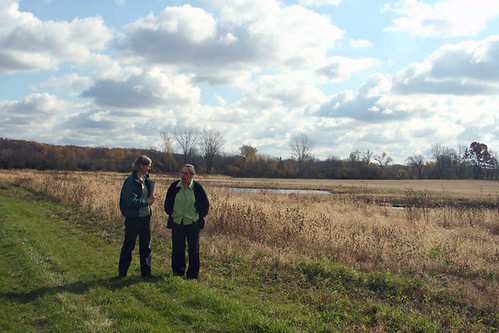
Elsbeth and Siegfried Fuchs, immigrants from Prussia, known nowadays as Germany, bought a 138-acre farm in Waterloo, Wisconsin. It was here they started dairy farming in 1964 and the couple farmed together until Siegfried passed away in 2008.
Back in 2009, Elsbeth saw a special on Wisconsin Public Television highlighting the Wetlands Reserve Program (WRP), and recognized it as an opportunity to fulfill her late husband’s wish—to restore the land back to its natural state.
USDA’s Natural Resources Conservation Service (NRCS) provides advice and funding to help landowners protect, restore, and enhance wetlands on their property through the Wetlands Reserve Program (WRP).
A perfect fit for the wetlands program, Elsbeth enrolled 85 acres of the farm into a permanent conservation easement. Restoration work included removing trees and water diversions, filling ditches, establishing micro-topography and seeding with native plant species.
Both open water and seasonal pools attract waterfowl and wildlife. The newly created wetland includes shallow marshes, a floodplain forest and upland prairies. These unique habitats support wildlife and aquatic ecosystems.

The newly restored wetland compliments the neighboring 4000 acre Waterloo Wildlife Area and its diverse range of habitats which include open water marsh, sedge meadows, hardwoods, and some native prairie.
Elsbeth is enjoying the restored land and her beautiful garden. She has been able to help her family with finances and she rents out her remaining forty-five acres for crop production.
“The whole world is in turmoil, and people look to America to lead and to grow food to feed the world,” Elsbeth said.
Through the wetlands program, Elsbeth was able to achieve Mr. Fuchs’ desire to “give back” to America and provide future generations with what he said everyone needs, “a little bit of paradise.”
Learn more about NRCS and the Wetlands Reserve Program.
Follow NRCS on Twitter.
Check out other conservation-related stories on the USDA blog.



